- Home
- Edward Cline
Empire Page 2
Empire Read online
Page 2
The attorney began pacing again as he spoke. His companions could not decide whether he was moved by excitement or by agitation.
“But, no.…No, sirs! I do not see it ever happening! Parliament would not consider the matter at all! That is, the only persons who could and would venture to compose a bill on that subject to be debated by a committee of the whole House, are not in Parliament — my correspondents there in London.” Reisdale stopped to wave his arms and bark in a scoffing laugh. “Wilkes? The cider tax? The influence of the court party? These are nothing, these are but trifles, when one contemplates the terrible, riving crisis caused by doubts about the Constitution! We would endure a crisis greater than the Glorious Revolution — and one bloodier than the Civil War.”
He shook his head in unbelieving desperation. “It’s too logical, I say. Too…gravely imperative. Why, a recasting of the Constitution specifically to preserve and enhance our liberties would require that England shed both the monarchy and a corruptible Parliament! And who is more likely to light the fuse to that powder keg? Englishmen at home, or Englishmen here? We are, sirs! Has not the match already been struck? Have you heard what that rabble-rouser in Hanover talked a jury into doing? Pastor Acland came to me a day ago to ask me about the legality of the award. He said it was a slight to the Crown, and ought to be punished. I informed him that the Crown may not punish a court and a jury for doing their duty, for they were protected by the Great Charter. He did not like that logic, sirs! But, before you know it, that brand of duty will move us to petition Parliament to recognize our right to disallow, in angry reciprocation, every act it passes, and every decision by the Privy Council and the Board of Trade. Mr. Franklin’s Albany congress would become feasible, and some congress of legislatures here would begin disallowing at their pleasure all the Crown’s laws and directives!”
Reisdale, with open, pleading hands, turned from one fact to another. “Can you not see the progression to tragedy? Disallowance would lead to disobedience. Disobedience would lead to rebellion. Rebellion would lead to punitive reprisal! Reprisal would lead to…war.” He shook his head again. “Yes, sirs! I see the logic in Mr. Proudlocks’s cogitations. It is straight and unbranched and unaccommodating. That is where it would lead us. It is a horrendous logic, persuading us of a ludicrous conclusion.” He paused. “But…if our liberties must be taken as seriously by legislators as we ourselves take them…then that logic is inescapable.”
Reisdale stopped suddenly and slumped into his armchair. His companions noted the anxiety in his face as he stared at the floor, an anxiety that was almost tangible to them. “Oh, sirs!” he said quietly, in not quite a whisper. “All these years, I have been but a sweating baker, concocting mere political pastries in the oven of my mind, to be consumed in a single sitting, and then forgotten. My mind is now aflame and topsy-turvy.” He glanced up at Hugh and Jack. “And you, sirs: What are your own thoughts on the matter?”
Hugh shrugged lightly. “The Constitution must be sheared of the monarchy, and Parliament reformed against the corruption of liberty, and begun afresh.” He added, “Nothing is too logical, come what may.” He turned in his chair. “Mr. Frake?”
Jack said, “Or, we must shed the mother country, to begin afresh — come what may.” He paused. “Liberty must someday emerge from the caves in which she has dwelt for so long, and claim her rightful place in the full sunlight. I agree with Mr. Reisdale. That is more likely to happen here, and not in England.”
Hugh looked with surprise at his friend.
But Jack did not notice. He was hearing another voice, that of a friend from long ago: “Oh, Jack! Can you imagine it? No kings, and so no need for all the varieties of danegeld!…Oh! Wild imagination! Suppose our colonies in America did such a thing? Can you imagine them nullifying their numbing bondage? Revoking their oath of loyalty to the King? Not petitioning him for protection from Parliament? What an outlandish miracle that would be! The parable of the loaves and fishes is much more credible a tale!” He smiled in memory of the man who had spoken those words, and of the boy who had heard them, and for a moment forgot the present and his company.
Reisdale sat speechless. The utterances of both men seemed to be necessary but contradictory ends of a logic that he would neither contemplate at length again nor speak with his own lips for years.
John Proudlocks only dimly grasped that something important — perhaps even dangerous — had just occurred. But he was observant enough to notice what Reisdale was too distraught to see: a schism between the masters of Meum and Morland Halls. He saw the confident, unyielding, but unconcerned sets in the expressions of the two men. He knew that both men had the capacity to act. He wondered now whether they had the capacity for violence in their convictions, for he was certain that they were both aware of the logic of those convictions, which could only lead to a clash between them.
He glanced at Mr. Reisdale. This man, he knew, was frightened by the prospect of violence between England and Englishmen here. This did not frighten Proudlocks; he had seen more violence and brutality in his young life than the attorney had in his fifty years. He glanced again at his friends Jack and Hugh. The prospect of violence between them did not frighten him, either. It merely made him sad.
After a while, the men spoke about the agenda for the next meeting of the Attic Society at the King’s Arms Tavern. Reisdale and Hugh left for their homes. When Proudlocks made to leave for his tenement, Jack said, “Thank you, John. You have foreshortened our wits and much of what is to come.”
Proudlocks nodded, and acknowledged the compliment with a simple “Yes.” Then he added, “I will check the seedbeds tomorrow morning, and see if Mr. Hurry is ready to sow the barley.”
* * *
Official copies of George the Third’s Proclamation were sent to all the royal governors of the colonies. Lieutenant-Governor Francis Fauquier received his copy, sealed with the red wax of the king’s coat of arms, long after most Virginians had read and discussed the edict and its implications.
In early January 1764, the day after the last bonfires of Twelfth Night had died out, the Sparrowhawk arrived in Caxton as dusk began to darken the waterfront. Captain John Ramshaw brought copies of the London Gazette, which contained the full text of the proclamation, to Jack Frake, and bundles of recent issues of the Gazette and other London newspapers to Wendel Barret of the Courier. Barret would reprint in his newspaper many of the articles he found in the London papers.
Ramshaw found the shop still open. After an exchange of greetings with the printer, he slapped a copy of the Gazette on the shop counter, and with a finger stabbed the front page. “This, sir, may deserve a special number of your paper. You people are being fitted for fetters.”
Barret, a short, stocky man in his fifties with black, twinkling eyes that could swiftly change to pins of contempt, raised his eyebrows. “Oh? How so?” He bent to read the first page. “A proclamation? I see…. ”
Ramshaw also brought mail. Two large parcels of letters and newspapers were addressed to Hugh Kenrick from his father and Dogmael Jones, and one parcel for Jack Frake. Barret’s shop also served as a post office for Caxton. The printer sent one of his apprentices to Meum Hall with Hugh’s mail, and to Morland with Jack’s. There was mail for the other planters and residents of the town and country, Ramshaw told the printer. His bursar would bring it up the next morning.
Hugh read the proclamation in the Gazette over his breakfast. Then he went to the stable, saddled his horse, and rode to Morland Hall on the narrow path that connected the two plantations. He met Jack halfway on it, heading for Meum Hall. They grinned at each other, and waved their copies of the paper in the air.
Then their grins vanished. “We were right, Hugh,” said Jack. “There is no room for doubt now.”
Hugh nodded. “The lion was issuant,” he remarked. “Now it is rampant.”
Three days later, a special edition of the Courier was sent to its subscribers. It contained the text of the king’s proclamation, in small,
tight print. It occupied the first and second pages.
Reece Vishonn was one of the subscribers. At Enderly, in his library, he reread the paragraph that proclaimed the closing of the frontiers, and sat blinking in a disbelief that eventually succumbed to anger. At last he could no longer contain himself.
He exclaimed, “Your royal will and pleasure be damned, sir!”
Chapter 2: The Dioscuri
“I am compelled by His Majesty’s gracious proclamation to speak out of turn,” said Reverend Albert Acland from his pulpit on the second Sunday of February, “and to depart, if only briefly, from our sacred liturgy, at my own humble discretion. I quote Matthew, verse sixteen.”
He paused to note the passive, attentive faces of the parishioners looking up at him. His glance roamed over the men, women, and children who sat huddled together in the chilly confines of Stepney Parish Church. The building’s wooden steeple above creaked and sighed with every winter gust that swept around it, and the constant draft through the windows and gaping holes in the mortar numbed one’s feet and sent exposed hands and fingers to curl inside the warmest pockets of one’s garb. It was cold enough that he saw his own breath as he spoke, his words as staccato bursts of vapor that dissolved in the air almost before he completed them.
All the great planters and their families were here this morning: the Vishonns, the Granbys, the Cullises, the Otways. All but two, though many of the tenants and servants of Meum and Morland Halls were present. He often wondered what those people thought of their masters, the masters who would not deign to set foot inside his church.
Reverend Acland knew what those men thought of him. Jack Frake despised him, so much so that he would not even register his contempt in the pastor’s presence. That one was beyond redemption. But he had nurtured hopes for Hugh Kenrick. These were dashed one fall day last year, when he chanced upon that man outside of Mr. Rittles’s shop in town. He had enquired, in an impartial, conversational manner, “Dear sir, why do I never see you at services, giving thanks to God and assuring Him of your devotion?”
Hugh Kenrick had looked at him with frosty amusement, then said, as though it was a chore to even bother with composing a reply, “Because, dear reverend, on Sunday mornings I perform that service in my library, by reading Mr. Locke, and Mr. Trenchard, and Mr. Addison, and books on the wonders of science and of the world. Currently, I am captivated by a treatise on human physiognomy, written and illustrated by a Dr. Leighton, of the College of Surgeons in London. He makes some interesting observations on how the subtleties of the skull’s contours affect one’s appearance.” The planter had paused to smile. “Now, sir, if you possessed a particle of Jesus’ benevolence, you would not doubt or contest that answer, but instead think: Ah! So, that is how this gentleman thanks God and expresses his devotion. He absorbs knowledge of God’s wondrous works and those of his children. What need of him to sit in a cold pew, listening to me recite musty sermons, intone supplicating prayers, and lead a raucous congregation in the singing of musty psalms? Why, he is more virtuous than I.”
Acland had been so startled by the answer that he forgot to be offended. He’d asked, hopefully, “Is that how you regard your absence, sir?”
Hugh Kenrick had shaken his head, this time with solemn amusement. “No, sir, that is not how I regard it.” And in his expression the pastor saw the unmistakable, silent message: No man is the ward of my soul, neither my friends, nor my acquaintances, nor a ghost, nor, least of all, you, sir.
Reverend Acland recovered from the pain of the moment, and added it to his secret pile of resentments. This morning he had the satisfaction of seeing nearly a full congregation. The townsmen, traders, and artisans were well represented. The McRaes were here, too, and the Stannards, the Tippets, and even, for once, the tobacco inspector and bachelor, Richard Ivy.
Acland cleared his throat and continued. “’Lay not up for yourselves treasures of the earth, where moth and rust doth corrupt, and where thieves break through and steal; but lay up for yourselves treasures in heaven, where neither moth nor rust doth corrupt, and where thieves do not break through nor steal.”
As he spoke, his glance rested in turn for a mere second each on the stubborn, petulant face of Reece Vishonn; on the stoic face of Ira Granby; on the tired, ironic face of Ralph Cullis. All three planters owned large tracts of land west of the Blue Ridge, bought years ago in speculative greed. His Majesty’s recent proclamation rendered title to those lands nugatory. That was justice, mused the pastor, and God’s justice, at that. Reece Vishonn, among all the planters in the county, stood to lose the most. This man had shown him the least sympathy when the Two-Penny Act was passed by the General Assembly, reducing the reverend’s salary. This man, the most powerful voice among Stepney Parish’s vestrymen, had more or less told him to be satisfied or be gone. This man, among all the men who sat on the county court, had blocked his initial moves to sue the parish for back pay, by persuading his fellow justices, on one hand, to recognize the Crown’s disallowance of the Act, and, on the other, by assuring the pastor that a suit would mean years of costly litigation and the expenditure of more than the pastor had then or could ever hope to recover.
Reverend Acland had heard the grumblings of the planters over the proclamation. He took some satisfaction in the knowledge that they could neither settle those lands nor clear them, nor survey them, nor exploit them in any manner, except at the risk of armed conflict with either the Indians or the army. Nor could they sell those lands now, except to Crown agents, on Crown terms. Nor could they escape to them, except at peril of torture, death, and even slavery at the hands of the Indians, or eviction and fines by the Crown.
This morning, Reverend Acland felt emboldened to remind them all of their duties — of their Christian duties, and of their duty to obey the king. Religion, to the pastor, long ago became not so much a creed of personal salvation as an invaluable tool of vengeance on those who seemed to be more successful in living than he. His regular exhortations for humility, modesty, and states of grace in the eyes of the Lord disguised a malice which most of his congregation mistook for earnest righteousness.
Etáin McRae, later that morning over breakfast in the modest house that stood in back of her father’s store, startled her parents with the observation, “If we are not to care about treasures of the earth, we should all become poor, and so have neither house nor clothes nor the means to support a church. There would be no church. Are not our treasures responsible for Reverend Acland’s pulpit and fine vestments?”
Ian and Madeline McRae stared at their daughter, and were at a loss to answer. After a moment, Ian McRae cleared his throat and said, “Many teachings of the Church should not be taken literally, Etáin. They are exempt from logic.”
Etáin frowned. “‘Thou shalt not do murder’ — that is plain enough,” she said, oblivious to her parents’ surprise. “And, ‘Thou shalt not steal.’ Though I do not believe a bishop would be able to explain to me why they are right commandments.” The girl paused to rest her chin on a hand. “But what Pastor Acland said this morning, that was sophistry. If he meant it, then he should vacate his own house, and go about in rags, beg for food, and preach on people’s doorsteps. What he said this morning, I thought was vindictive. He is a hypocrite. I think all ministers are hypocrites, whether they are English churchmen or wandering divines.”
Madeline McRae, more cosmopolitan and worldly than any other woman in Caxton, could only reply, with a stern but gentle urgency, “Etáin, that is enough.”
Ian McRae’s mind simply choked on his daughter’s words. He could not find any words with which to reply. He sat blinking at his daughter, more frightened for her than offended by her.
Etáin frowned again, and did not pursue the subject. In the back of her mind, as a measure against Reverend Acland’s sermons and notorious piety, were the two men who were, to her, exemplars of moral action and worth. They were, for her, treasures of the earth, and she would not renounce them.
; * * *
Lieutenant-Governor Francis Fauquier understood the intent of the proclamation at least as well as did the minister. Unlike that man, however, he possessed more than one particle, if not of Christ’s benevolence, then of humanist concern for the edict’s implications and for the grace of his colonial subjects. In February, after reading its velvety paragraphs and pondering their explicit meanings, he wrote to the Board of Trade, profusely praising the ukase on one hand, and on the other humbly contradicting his praise by broaching the issues which he sincerely believed that His Majesty, his Privy Council, and their lordships of the Board might not have given their full attention. He inquired about the status of all the legal settlers west of the demarcation line, in addition to the hundreds of thousands of acres of land that had been patented by individuals and land companies decades ago, on much of which taxes and quitrents had already been paid. Many of these patents had been granted by past royal governors and approved by the king, the Council, and the Board. In fact, he tactfully pointed out, both the settlements and the patents had been encouraged by the Crown’s own policies. The new policy, he gently reminded his superiors, was truly a reversal, and could not be implemented without risking grave consequences or with any hope of success.
Fauquier was skittish, for while he felt it was his duty to raise the subject, he did not want to risk still another reprimand from the Board. Their lordships were not pleased, he knew, with his habit of signing acts and legislation passed by the General Assembly but to which had not been appended suspending clauses, which allowed the Board or Privy Council to nullify legislation they did not like. They did not tire of reminding him that it was not his prerogative to endorse such laws and thus violate their explicit instructions to veto any law sent up from the House of Burgesses and his Council that did not carry the mandatory suspending clause. And they were especially not happy with his practice of exercising his own judgment and defending both a clause-less law and his oversight by pleading the colony’s extenuating circumstances in long, apologetic, and irrelevant discourses.

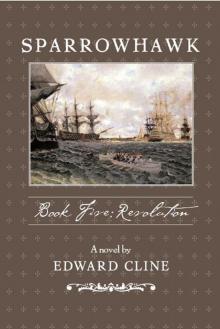 Revolution
Revolution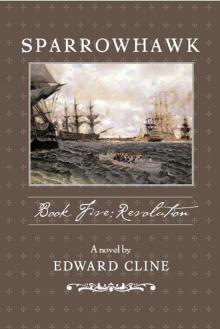 SH05_Revolution
SH05_Revolution War
War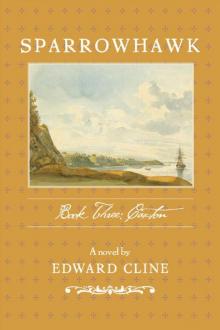 SH03_Sparrowhawk: Caxton
SH03_Sparrowhawk: Caxton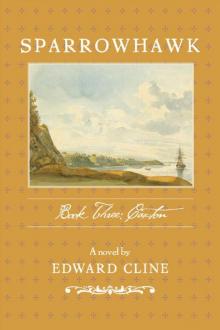 Sparrowhawk III
Sparrowhawk III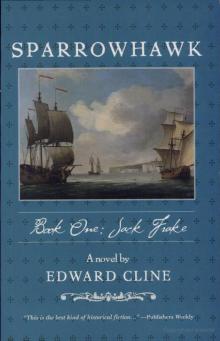 Jack Frake
Jack Frake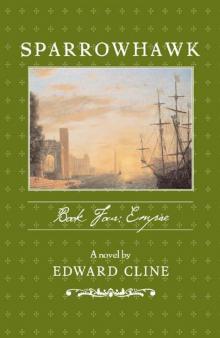 SH04_Empire
SH04_Empire Empire
Empire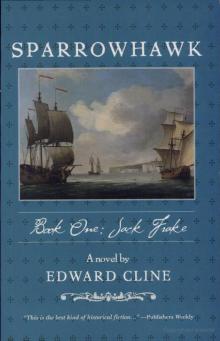 SH01_Jack Frake
SH01_Jack Frake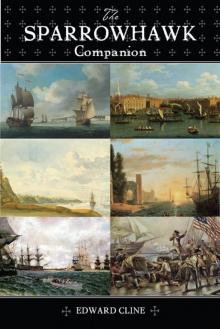 The Sparrowhawk Companion
The Sparrowhawk Companion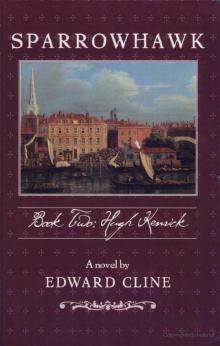 Hugh Kenrick
Hugh Kenrick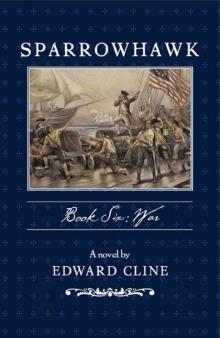 SH06_War
SH06_War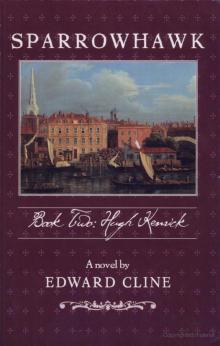 SH02_Hugh Kenrick
SH02_Hugh Kenrick